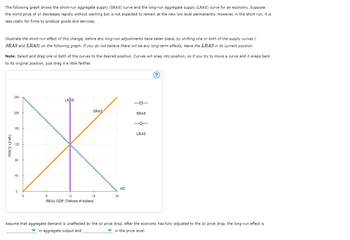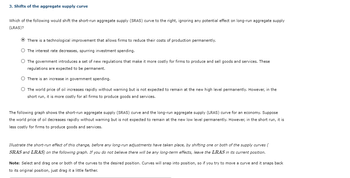
ENGR.ECONOMIC ANALYSIS
14th Edition
ISBN: 9780190931919
Author: NEWNAN
Publisher: Oxford University Press
expand_more
expand_more
format_list_bulleted
Question
no handwritten notes!

Transcribed Image Text:The following graph shows the short-run aggregate supply (SRAS) curve and the long-run aggregate supply (LRAS) curve for an economy. Suppose
the world price of oil decreases rapidly without warning but is not expected to remain at the new low level permanently. However, in the short run, it is
less costly for firms to produce goods and services.
Illustrate the short-run effect of this change, before any long-run adjustments have taken place, by shifting one or both of the supply curves (
SRAS and LRAS) on the following graph. If you do not believe there will be any long-term effects, leave the LRAS in its current position.
Note: Select and drag one or both of the curves to the desired position. Curves will snap into position, so if you try to move a curve and it snaps back
to its original position, just drag it a little farther.
PRICE LEVEL
LRAS
SRAS
X
6
12
18
REAL GDP (Trillions of dollars)
240
200
160
80
40
0
0
24
AD
0
SRAS
LRAS
(?
Assume that aggregate demand is unaffected by the oil price drop. After the economy has fully adjusted to the oil price drop, the long-run effect is
in aggregate output and
in the price level.

Transcribed Image Text:3. Shifts of the aggregate supply curve
Which of the following would shift the short-run aggregate supply (SRAS) curve to the right, ignoring any potential effect on long-run aggregate supply
(LRAS)?
Ⓒ There is a technological improvement that allows firms to reduce their costs of production permanently.
O The interest rate decreases, spurring investment spending.
O The government introduces a set of new regulations that make it more costly for firms to produce and sell goods and services. These
regulations are expected to be permanent.
O There is an increase in government spending.
O The world price of oil increases rapidly without warning but is not expected to remain at the new high level permanently. However, in the
short run, it is more costly for all firms to produce goods and services.
The following graph shows the short-run aggregate supply (SRAS) curve and the long-run aggregate supply (LRAS) curve for an economy. Suppose
the world price of oil decreases rapidly without warning but is not expected to remain at the new low level permanently. However, in the short run, it is
less costly for firms to produce goods and services.
Illustrate the short-run effect of this change, before any long-run adjustments have taken place, by shifting one or both of the supply curves (
SRAS and LRAS) on the following graph. f you do not believe there will be any long-term effects, leave the LRAS in its current position.
Note: Select and drag one or both of the curves to the desired position. Curves will snap into position, so if you try to move a curve and it snaps back
to its original position, just drag it a little farther.
Expert Solution
This question has been solved!
Explore an expertly crafted, step-by-step solution for a thorough understanding of key concepts.
Step by stepSolved in 5 steps with 2 images

Knowledge Booster
Learn more about
Need a deep-dive on the concept behind this application? Look no further. Learn more about this topic, economics and related others by exploring similar questions and additional content below.Similar questions
- Does “owning” the extra credit and losing it make you value it more or less?arrow_forwardWhat is a transfer payment?arrow_forwardSelect 6 online companies you are familiar with and visit their Web sites. How many of them have privacy policies posted on their sites? What are these policies?arrow_forward
arrow_back_ios
arrow_forward_ios
Recommended textbooks for you

 Principles of Economics (12th Edition)EconomicsISBN:9780134078779Author:Karl E. Case, Ray C. Fair, Sharon E. OsterPublisher:PEARSON
Principles of Economics (12th Edition)EconomicsISBN:9780134078779Author:Karl E. Case, Ray C. Fair, Sharon E. OsterPublisher:PEARSON Engineering Economy (17th Edition)EconomicsISBN:9780134870069Author:William G. Sullivan, Elin M. Wicks, C. Patrick KoellingPublisher:PEARSON
Engineering Economy (17th Edition)EconomicsISBN:9780134870069Author:William G. Sullivan, Elin M. Wicks, C. Patrick KoellingPublisher:PEARSON Principles of Economics (MindTap Course List)EconomicsISBN:9781305585126Author:N. Gregory MankiwPublisher:Cengage Learning
Principles of Economics (MindTap Course List)EconomicsISBN:9781305585126Author:N. Gregory MankiwPublisher:Cengage Learning Managerial Economics: A Problem Solving ApproachEconomicsISBN:9781337106665Author:Luke M. Froeb, Brian T. McCann, Michael R. Ward, Mike ShorPublisher:Cengage Learning
Managerial Economics: A Problem Solving ApproachEconomicsISBN:9781337106665Author:Luke M. Froeb, Brian T. McCann, Michael R. Ward, Mike ShorPublisher:Cengage Learning Managerial Economics & Business Strategy (Mcgraw-...EconomicsISBN:9781259290619Author:Michael Baye, Jeff PrincePublisher:McGraw-Hill Education
Managerial Economics & Business Strategy (Mcgraw-...EconomicsISBN:9781259290619Author:Michael Baye, Jeff PrincePublisher:McGraw-Hill Education


Principles of Economics (12th Edition)
Economics
ISBN:9780134078779
Author:Karl E. Case, Ray C. Fair, Sharon E. Oster
Publisher:PEARSON

Engineering Economy (17th Edition)
Economics
ISBN:9780134870069
Author:William G. Sullivan, Elin M. Wicks, C. Patrick Koelling
Publisher:PEARSON

Principles of Economics (MindTap Course List)
Economics
ISBN:9781305585126
Author:N. Gregory Mankiw
Publisher:Cengage Learning

Managerial Economics: A Problem Solving Approach
Economics
ISBN:9781337106665
Author:Luke M. Froeb, Brian T. McCann, Michael R. Ward, Mike Shor
Publisher:Cengage Learning

Managerial Economics & Business Strategy (Mcgraw-...
Economics
ISBN:9781259290619
Author:Michael Baye, Jeff Prince
Publisher:McGraw-Hill Education